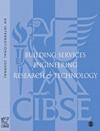建筑物变电站噪声特性分析
IF 1.8
4区 工程技术
Q3 CONSTRUCTION & BUILDING TECHNOLOGY
Building Services Engineering Research & Technology
Pub Date : 2021-08-05
DOI:10.1177/01436244211035672
引用次数: 1
摘要
城市化导致了变电站数量的增加,这导致了微不足道的建筑噪音问题。然而,由于不充分的噪声表征和对集中式变电站使用不完善的噪声评估指标,噪声问题仍然存在。基于这一问题,本文提出了一种基于经验模态分解和频谱分析的变压器振动噪声耦合分析方法。该方法准确、有效地屏蔽和表征了变压器噪声,为变压器降噪提供了理论依据。为了验证该方法的有效性,以变压器为例进行了重构。发现变压器的低频噪声主要是由频率低于500Hz的振动引起的,特别是频率为300Hz、100Hz和50Hz的振动。通过对特征值的计算和分析,提出了以减振为主的降噪措施。最终,噪音降低了10dB,满足了舒适性要求。该方法能够准确有效地识别变压器噪声的特性,弥补了以往变压器特性分析的不足。为完善变压器噪声评价指标提供指导。实际意义:变电站引起的噪声问题越来越严重。传统的噪声检测和降噪方法已不能满足人们对声音舒适性的要求。本文提出的基于EMD和频谱分析的振动与噪声耦合分析方法可以有效地提取变压器噪声的特征。为变压器的降噪改造提供了理论支持,解决了目前工程降噪改造没有理论依据的问题。噪声特性分析可以弥补现有声学舒适性指标仅以声压级作为评价指标的不足。本文章由计算机程序翻译,如有差异,请以英文原文为准。
Analysis of the characteristics of noise from substations in buildings
The urbanization has resulted in an increasing number of transformer stations, which has resulted insignificant building noise problems. However, noise problems persist because of inadequate noise characterization and the use of imperfect noise evaluation indexes for centralized substations. Based on this problem, a transformer vibration noise coupling analysis method based on empirical mode decomposition (EMD) and spectrum analysis is proposed in this study. The proposed method accurately and effectively screens and characterizes transformer noise and provides a theoretical basis for transformer noise reduction. To verify the effectiveness of the proposed method, a transformer was reconstructed as an example. It was found that the low-frequency noise from the transformer was mainly caused by vibrations with a frequency below 500 Hz, particularly frequencies of 300 Hz and 100 Hz and 50 Hz. Through the calculation and analysis of eigenvalues, the noise reduction measures focusing on vibration reduction were proposed. In the end, a noise reduction of 10 dB was achieved, which meets the comfort requirements. This method can accurately and effectively identify the characteristics of transformer noise, which makes up for the insufficiency of transformer characteristics analysis in the past. Provide guidance for perfecting transformer noise evaluation index. Practical implication: The noise problem caused by substations is getting more and more serious. Conventional noise detection and noise reduction methods can no longer meet people’s requirements for sound comfort. The coupling analysis method of vibration and noise based on EMD and spectrum analysis proposed in this study can effectively extract the characteristics of transformer noise. It provides theoretical support for the noise reduction transformation of transformers, and solves the problem that the current engineering noise reduction transformation has no theoretical basis. Noise characteristic analysis can make up for the shortcomings of existing acoustic comfort indicators that only use sound pressure level as the evaluation indicator.
求助全文
通过发布文献求助,成功后即可免费获取论文全文。
去求助
来源期刊

Building Services Engineering Research & Technology
工程技术-结构与建筑技术
CiteScore
4.30
自引率
5.90%
发文量
38
审稿时长
>12 weeks
期刊介绍:
Building Services Engineering Research & Technology is one of the foremost, international peer reviewed journals that publishes the highest quality original research relevant to today’s Built Environment. Published in conjunction with CIBSE, this impressive journal reports on the latest research providing you with an invaluable guide to recent developments in the field.
 求助内容:
求助内容: 应助结果提醒方式:
应助结果提醒方式:


